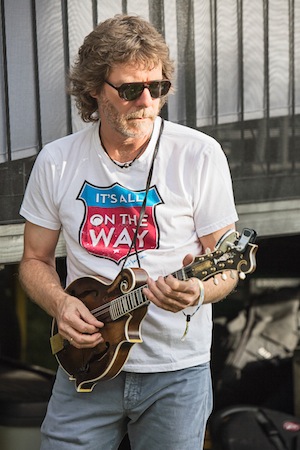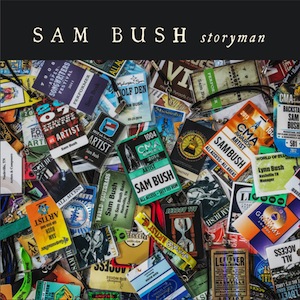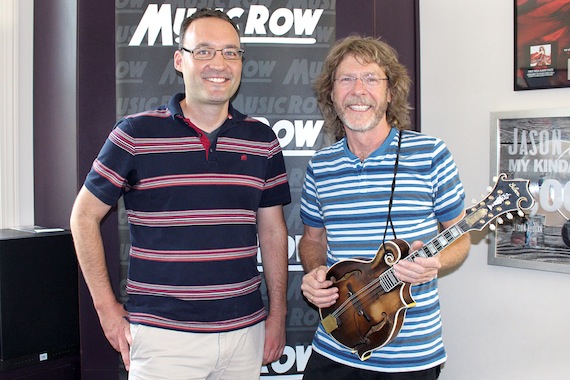

Sam Bush. Photo: Shelley Swanger
Sam Bush says he didn’t set out to write every song on his new Sugar Hill Records album, Storyman. But over the course of four or five years, he kept collaborating with friends until he had more than a dozen songs stashed away.
Many of his co-writers are familiar names in Nashville: Guy Clark, Emmylou Harris, Jon Randall Stewart, and members of his band. In the 1970s and 1980s, Bush made a mark as a member of the innovative New Grass Revival. In the 1990s, he picked up three IBMA Awards for mandolin player of the year and released several acclaimed albums as a solo artist. In 2009, he received a Lifetime Achievement Award from the Americana Music Association and he’s earned CMA nominations in the Musician category every year since 2011.
In other words, he’s the rare entertainer who can play the Opry on a Friday night and City Winery on Saturday (which he just did over the weekend).
Bush dropped by MusicRow for an easygoing visit, living up to the title of Storyman.
 MusicRow: One thing I noticed throughout a lot of the songs, especially in the beginning, is the positive attitude. This might sound funny, but do you attribute your longevity in the business to having a good attitude?
MusicRow: One thing I noticed throughout a lot of the songs, especially in the beginning, is the positive attitude. This might sound funny, but do you attribute your longevity in the business to having a good attitude?
Sam Bush: A good attitude really helps because as a traveling musician, everything doesn’t always go your way, but I’ve been doing this since I got out of high school in 1970, so I think I’ve learned more about rolling with certain punches. You know, success is in the eye of the beholder. I’ve made a living making music that I love to play now for 46 years and, in that way, I feel successful. And we have an audience to play for.
Have you ever needed to get a day job?
Well, yeah. (laughs) Just a couple though. Immediately out of high school up in Bowling Green, I had the choice to go to Western Kentucky University on a partial violin scholarship, or move up to Louisville. So before I moved to Louisville to play in a band called Bluegrass Alliance, I moved away from my parents’ farm. As a kid growing up on a farm, I know what real work is.
And our parents encouraged us to get off the farm. I thought they didn’t want us to work like they had to. So, I had a real job for 18 years, which was whatever my dad told me to do on the farm. And I was a guitar teacher in Louisville to supplement, but I’ve been fortunate that once I started playing music for a living, I got to keep doing it.
I think “Bowling Green” is a very touching song.
It is for me too. Jon Randall Stewart, who’s now become a major songwriting force in Nashville, came over and he said, ‘Man, I’ve got a song for us.’ And the first verse, Lynn and I teared up on the spot, so I said, “OK, let’s get it going.”
We wanted to write that where you interject little fiddle tunes. That’s exactly what’s it talking about, speaking of my dad’s love of fiddle. The lyrics will tell you, “He loved to saw ‘The Wagoner,’ the one from Tennessee.’” That’s the tune “Tennessee Wagoner,” but he only called it “The Wagoner.” He used to be involved in the fiddle contests down here in Nashville, the Grand Masters, and all the Texas fiddlers played a little differently and threw in another chord that the Tennessee fiddlers don’t do. So my dad would always go, “Nah, I want to hear ‘The Wagoner,’ the one from Tennessee—not that Texas wagoner!” (laughs)
 I enjoyed your sense of humor in “Handmics Killed Country Music.”
I enjoyed your sense of humor in “Handmics Killed Country Music.”
Yeah, Emmylou and I mean for it to be a lighthearted song. Obviously there’s a thriving country music industry not suffering from any lack of whatever. I had that phrase in mind for a couple of years and I would go around and say it to other songwriters and no one seemed to want to write this with me! I knew I couldn’t get it done by myself and I needed someone who loved guitars and that thought.
Emmylou and I got to talking about it and said it must have been when they got on TV and were told, “Here, just hold this mic.” (laughs) But I realized when we’d see those old Time-Life advertisements that last half an hour, we’d just sit and look at their guitars. You could identify them. Don Gibson played a big Gibson Super 400. Porter Wagoner was known later mostly for a J-200. Lester Flatt had a Martin D-28. Ernest Tubb and Loretta Lynn played Epiphones.
We decided right off the bat it should be an old country shuffle. Thinking about my band, we’re well-versed in a lot of areas, but country shuffle isn’t one of them. We wanted piano, and rather than getting someone to copy an old style, we decided to get the master, so I called Pig Robbins. He said, “Country shuffle?! I haven’t played on one of those in 20 years! Let’s do it!” So it was really a trip working with Pig because all the guys in my band really stepped to it.
In the liner notes, you mention “the joy of the jam.” What is that experience like for you?
I know that when I jump in with my band, it’s like jumping into a warm pool. It’s a comforting thing. For me, the joy of music is playing with other people. It’s been suggested that I should play solo shows. They don’t appeal to me because I don’t get that joy without playing with other people, when everything’s going good and you’re not thinking about anything. To me, you’ve succeeded when everybody’s on the same channel thinking about the music. And our band’s really successful at being able to channel while we’re up there, and letting that be our joy.

Pictured (L-R): Craig Shelburne, GM, MusicRow; Sam Bush



